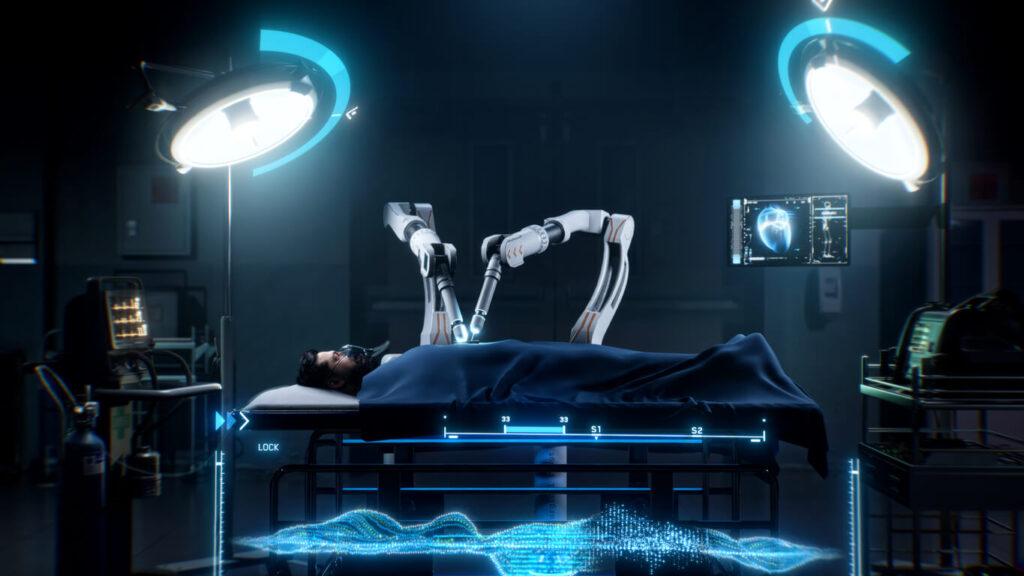The emergence of Artificial Intelligence (AI) is driving a subtle but significant revolution in the fast-paced and constantly changing healthcare industry.
Once restricted to science fiction, AI is today a real and significant factor in saving lives worldwide. It helps with disease diagnosis, health risk assessment, patient care personalisation, and even precise surgical guidance. It is more than just a tool. It is saving lives in ways we never thought were conceivable.
How AI Impacts Healthcare?
AI is present in many industries, but healthcare is a vital industry where people’s lives frequently depend on it. AI technology in healthcare has the potential to transform the industry completely, bringing in a new era of proactive patient care and precision medicine by enhancing medical procedures and patient care. Various areas benefit from the implementation of AI, including the creation of new medications, tailored treatment plans, and enhanced diagnostic techniques.
Improving Healthcare Delivery
Healthcare is one of the most important fields where AI is saving lives. Even with their great experience, medical practitioners cannot diagnose every illness or condition. That’s where AI comes into place; AI-driven solutions, like healthcare analytics platforms, can create a comprehensive patient analysis, identify patients at risk of readmission and give physicians practical advice on handling the issue. Additionally, such software enhances data sharing and management, assists in lowering mortality rates, predicts chronic diseases, and prevents hospital-acquired infections.
The COVID-19 pandemic made the sector realise it needed AI solutions when access to patients was restricted. Researchers from Brigham and Women’s Hospital and Massachusetts Institute of Technology (MIT) created a method that enables a robot to measure a patient’s vital signs without making physical contact.
Preventing Accidents
Millions of people lose their lives in car accidents every year, with vulnerable road users suffering the greatest losses. To reduce the risk of accidents, AI technology is being used to create safer roads. AI-enabled autonomous vehicles are being developed to improve the safety of roads and reduce the number of accidents. The question is: are robots better drivers than humans?
The potential of AI to drive safer on the roads is one of its greatest benefits. Artificial intelligence can analyse data and make split-second choices that can avert mishaps through sensors, cameras, and sophisticated algorithms. Currently, AI is incorporated into a lot of apps that help prevent accidents. For example, Google Maps sends real-time traffic and road updates and alerts about accidents and road hazards to drivers.
Detecting Medical Conditions
AI has the potential to diagnose diseases like cancer, heart problems, and neurological disorders early as it is more precise and rapid in analysing medical imaging, such as MRI and CT scans, than traditional methods.
Medical conditions can also be detected, for example, through wearables. There are wearable devices that monitor your heart rate, blood pressure, and other vital signs, detecting any irregularities and even predicting chronic diseases. Wearables are also capable of alerting users and their doctors to health risks and conditions before they become serious. Furthermore, built-in chatbots and virtual assistants integrated into personal health records can offer patients information and appointment reminders and answer common queries, enhancing overall communication and engagement.
Improving Pharmaceutical Solutions
AI is revolutionising the pharmaceutical industry by streamlining the lengthy and complex process of drug development. Quickly analysing enormous biological and chemical databases, forecasting drug-target interactions, and modelling the effects of novel drugs on the human body speed up the process of finding new drugs.
For example, Moxa’s expansion modules enable control and monitoring of drug discovery automatic experiment equipment. Find out more in this article or watch the video below to see how Seventh People’s Hospital in China automates its drug dispensing system with ABB Robots.
Moreover, AI improves the effectiveness of clinical trials. It facilitates remote patient health monitoring, providing real-time data to expedite trial outcomes, and helps select appropriate trial participants, guaranteeing they will likely benefit from the treatment.
Robotics and AI-powered Devices in Healthcare
In many aspects of healthcare, including surgery and rehabilitation, robots are more commonly employed to replace or enhance the work of human personnel. Laparoscopic procedures and other robotically assisted surgeries improve accuracy, shorten recovery periods, and reduce problems.
Additionally, robotic assistants can support patients’ rehabilitation by restoring their independence and movement. Healthcare is changing due to AI’s integration with robots, which also improves patient outcomes and increases the skills of healthcare workers. Find out what other innovations improve healthcare in our article about the top 10 healthcare technology trends.
Proactive Care through Analytics
AI can identify people more prone to develop certain diseases or worsen pre-existing ones because of its capacity to examine data. Because AI algorithms can analyse patient data over time and provide early intervention and preventive medicine, they may enhance patient outcomes and reduce the burden on healthcare systems. AI can, for example, use data on food preferences, exercise habits, and blood pressure to predict potential problems in people with hypertension. Healthcare providers can use this data to create well-informed treatment plans and lifestyle advice that lower the risk of acute episodes and hospital stays.
Distrelec distributes PLCs that are perfect for predictive analysis. Explore our range of PLCs, whether you need them for medical equipment control, hospital or laboratory automation, pharmaceutical manufacturing or any other reason.
Optimising Hospital Operations with AI
AI can enhance hospital operations and resource management in addition to patient care. AI-powered solutions can locate bottlenecks and inefficiencies in hospital workflows by evaluating data on patient flow, staffing levels, and resource usage. By anticipating patient admission rates and making appropriate plans, predictive analytics can assist hospitals in allocating resources as efficiently as possible. AI can also help healthcare workers focus more on patient care by streamlining administrative duties like scheduling, billing, and inventory management.
The Challenges and Ethical Considerations
There are a number of obstacles to AI’s general adoption despite its enormous potential to transform healthcare and save lives. Obtaining regulatory approvals, integrating AI technologies with current health record systems, and guaranteeing uniform performance standards are a few of these. Furthermore, healthcare personnel must receive enough training in the usage of AI technologies.

Another factor is patient data security and privacy, as maintaining public trust and complying with regulations requires strong data protection and open policies. It’s important to remember that AI should support clinical decision-making by complementing human judgement and empathy, not replace it. This will help healthcare professionals offer the best possible care for their patients.
The Future of AI in Healthcare
AI is revolutionising the medical field, advancing patient care, medication development, and medical diagnostics. Although there are obstacles to overcome and moral dilemmas to resolve, artificial intelligence has tremendous promise in this area and has the ability to save lives and revolutionise healthcare delivery.
Distrelec is a supplying partner to many companies, like TDK-Lambda, Moxa, Traco Power, Intelligent LED Solutions and many more that provide solutions for the healthcare industry. Find out more here.
Disclaimer
All content and information in this article is for informational and educational purposes only and does not constitute medical advice.











